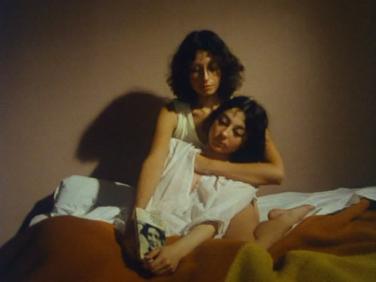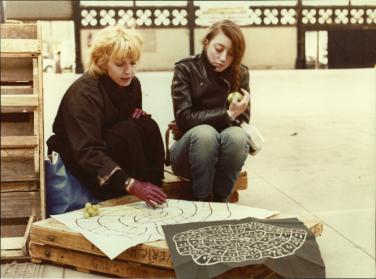

Pascale's character is called Baptiste. The character played by her mother Bulle Ogier is called Marie. The film is divided over four days while the two protagonists wander from one side of Paris to the other. And as the opening credits indicate, it all happens in "October or November of 1980, a long time ago".
Rivette explains that the film was written by the three of them. And that from that somewhat haphazard process the itineraries and plots of the film gradually emerged. Rivette says that the character of Marie could be the continuation of a role that the same actress played a short time before: the terrorist played by Bulle Ogier in Die dritte Generation / The Third Generation (1979), directed by Rainer Werner Fassbinder.
Marie has just gotten out of jail and is trying to regain contact with an old accomplice and lover. Marie remembers that she robbed a bank, that things went wrong, and that she still has pending issues with that past in which there are kidnappings, guns, political assassinations, and other crimes. Baptiste, on the other hand, is a young woman without a past who moves around the city on a motorcycle and who finds in the character of Marie the chance to finally have company.
And the film is the two of them in that four-day encounter and journey through the city, as if everything were a strange spy movie, as if their destiny were guided at the same time by chance and by the need to be together. The story seems to tell us that they couldn't not find each other.
The city is presented in a dual format: on the one hand, the historical Paris of sculptures, accompanied by the always elegant music of Astor Piazzolla. On the other hand, the "new Paris" of the eighties – with vacant lots, construction work, cranes, lots under construction, and machines destroying and building a new landscape. Marie and Baptiste move from the centre to that periphery. They sleep on benches, they sleep in cars, they sleep in cinemas, they visit police-guarded hotels, they review plans and make calls without us ever fully knowing who they are running from or where they are going. In this way, the plot abandons its film noir keys to become a film of fugitives in search of their place in the world.
We must remember now a short film that Rivette shot with the same actresses as part of the creation process: Le Pont du Nord. It could represent the filming notes, the location notes, the story notes and keys. In Paris s'en va (1981) it is explained that the map of Paris is like a game board for the Game of the Goose, and the aim is to roll the dice and play. Mother and daughter go through the 63 squares (jail, labyrinth, death...); and they gradually explain the instructions of the game. The Argentine Piazzolla can also be heard; thus, it is inevitable to think that somehow, perhaps, Julio Cortázar and his Rayuela / Hopscotch (1963) might have been present somewhere in this Rivette film's process. Or at least it's nice to think about that possibility.
Pascale wears, for most of the movie, a leather jacket that is like armour. She is 23 years old and in a very short time has become the image of a new generation: classic demeanour, wild attitude, totally unique. To remember: her motorcycle trips. To remember: her races along the banks of the Seine. To remember: the sequences in which she does karate and trains her kata in the middle of the street. Getting increasingly closer to dance.
Víctor Iriarte
Pascale Ogier on focus.
